Business Ethics Project: Equifax's CSR and Stakeholders
VerifiedAdded on 2023/01/12
|10
|3142
|25
Project
AI Summary
This project analyzes the ethical implications of the Equifax data breach, focusing on business ethics and corporate social responsibility (CSR). It provides an overview of the case, including the exposure of over 140 million individuals' personal data, and explores the ethical issues arising from the breach. The project defines CSR and discusses its importance in the context of the Equifax case. It then examines different approaches to CSR, including teleological, deontological, and virtue ethical theories, as well as descriptive ethical theories, to evaluate Equifax's actions. Furthermore, the project investigates the perspectives of various stakeholders, such as customers, on the company's behavior. The analysis includes legal and governmental responses to the breach, and concludes with recommendations to improve corporate ethical practices and stakeholder relations. The report highlights the importance of ethical management strategies, corporate governance, and the need for companies to establish and maintain strong relationships with their stakeholders.

PROJECT
(Business Ethics)
(Business Ethics)
Paraphrase This Document
Need a fresh take? Get an instant paraphrase of this document with our AI Paraphraser
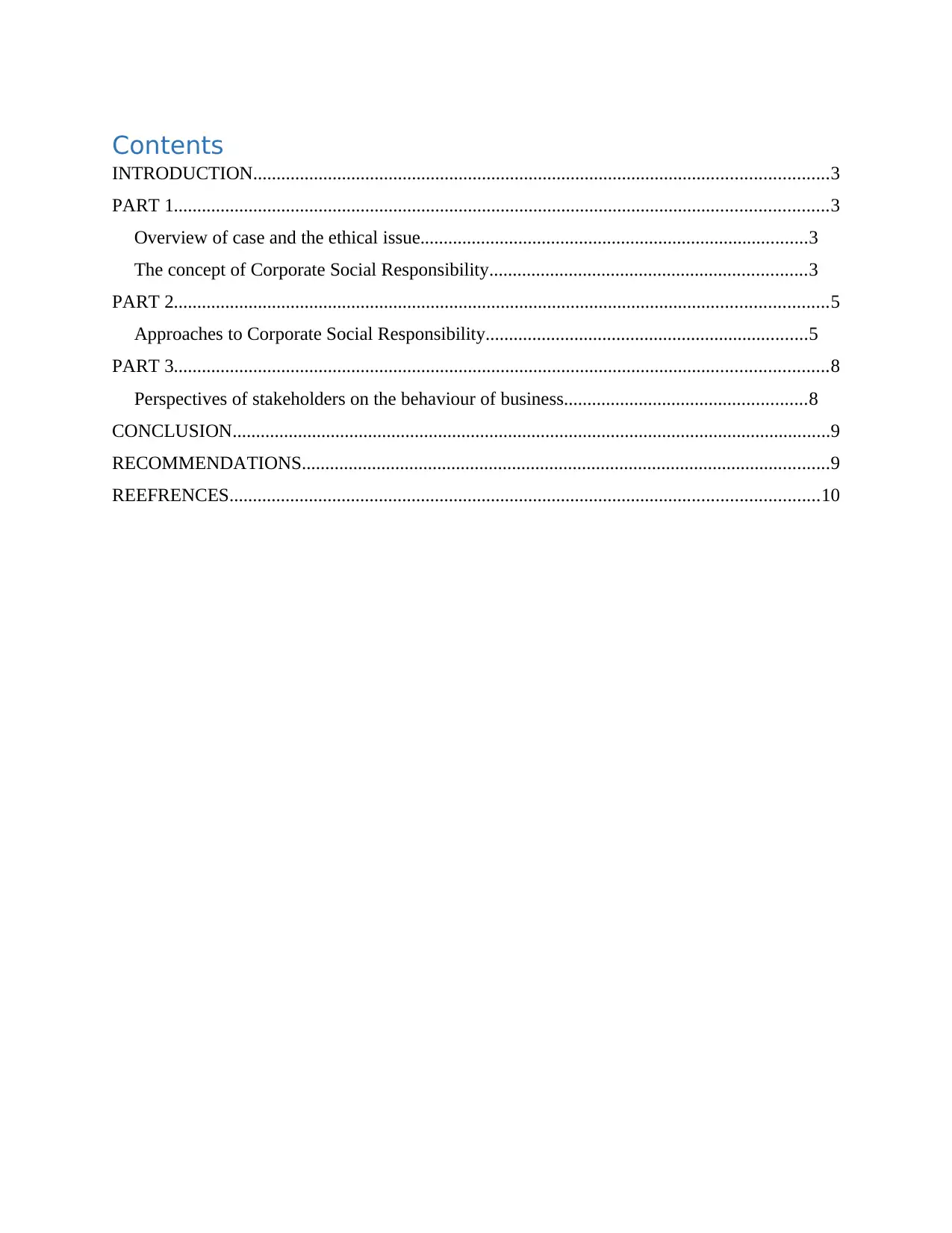
Contents
INTRODUCTION...........................................................................................................................3
PART 1............................................................................................................................................3
Overview of case and the ethical issue...................................................................................3
The concept of Corporate Social Responsibility....................................................................3
PART 2............................................................................................................................................5
Approaches to Corporate Social Responsibility.....................................................................5
PART 3............................................................................................................................................8
Perspectives of stakeholders on the behaviour of business....................................................8
CONCLUSION................................................................................................................................9
RECOMMENDATIONS.................................................................................................................9
REEFRENCES..............................................................................................................................10
INTRODUCTION...........................................................................................................................3
PART 1............................................................................................................................................3
Overview of case and the ethical issue...................................................................................3
The concept of Corporate Social Responsibility....................................................................3
PART 2............................................................................................................................................5
Approaches to Corporate Social Responsibility.....................................................................5
PART 3............................................................................................................................................8
Perspectives of stakeholders on the behaviour of business....................................................8
CONCLUSION................................................................................................................................9
RECOMMENDATIONS.................................................................................................................9
REEFRENCES..............................................................................................................................10
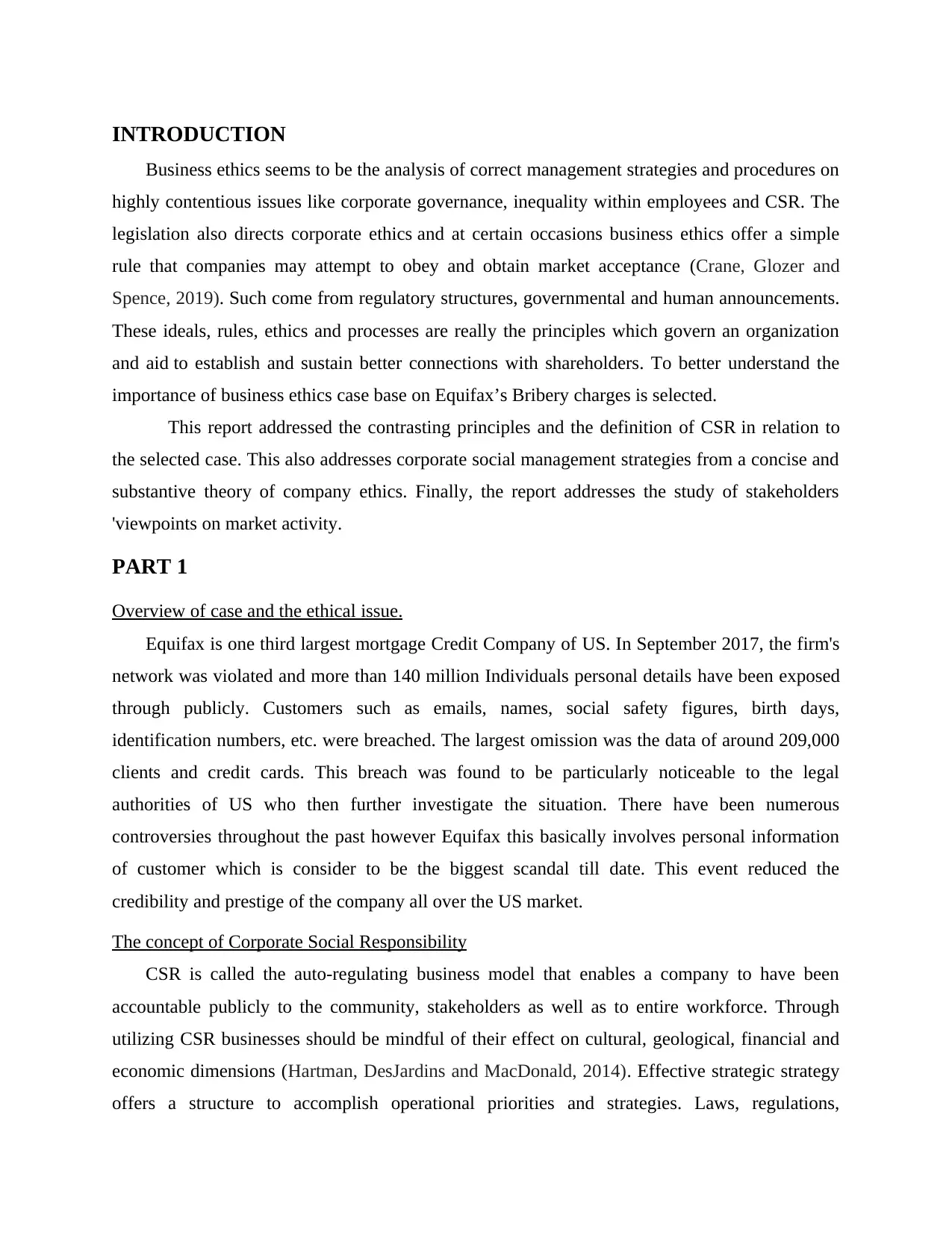
INTRODUCTION
Business ethics seems to be the analysis of correct management strategies and procedures on
highly contentious issues like corporate governance, inequality within employees and CSR. The
legislation also directs corporate ethics and at certain occasions business ethics offer a simple
rule that companies may attempt to obey and obtain market acceptance (Crane, Glozer and
Spence, 2019). Such come from regulatory structures, governmental and human announcements.
These ideals, rules, ethics and processes are really the principles which govern an organization
and aid to establish and sustain better connections with shareholders. To better understand the
importance of business ethics case base on Equifax’s Bribery charges is selected.
This report addressed the contrasting principles and the definition of CSR in relation to
the selected case. This also addresses corporate social management strategies from a concise and
substantive theory of company ethics. Finally, the report addresses the study of stakeholders
'viewpoints on market activity.
PART 1
Overview of case and the ethical issue.
Equifax is one third largest mortgage Credit Company of US. In September 2017, the firm's
network was violated and more than 140 million Individuals personal details have been exposed
through publicly. Customers such as emails, names, social safety figures, birth days,
identification numbers, etc. were breached. The largest omission was the data of around 209,000
clients and credit cards. This breach was found to be particularly noticeable to the legal
authorities of US who then further investigate the situation. There have been numerous
controversies throughout the past however Equifax this basically involves personal information
of customer which is consider to be the biggest scandal till date. This event reduced the
credibility and prestige of the company all over the US market.
The concept of Corporate Social Responsibility
CSR is called the auto-regulating business model that enables a company to have been
accountable publicly to the community, stakeholders as well as to entire workforce. Through
utilizing CSR businesses should be mindful of their effect on cultural, geological, financial and
economic dimensions (Hartman, DesJardins and MacDonald, 2014). Effective strategic strategy
offers a structure to accomplish operational priorities and strategies. Laws, regulations,
Business ethics seems to be the analysis of correct management strategies and procedures on
highly contentious issues like corporate governance, inequality within employees and CSR. The
legislation also directs corporate ethics and at certain occasions business ethics offer a simple
rule that companies may attempt to obey and obtain market acceptance (Crane, Glozer and
Spence, 2019). Such come from regulatory structures, governmental and human announcements.
These ideals, rules, ethics and processes are really the principles which govern an organization
and aid to establish and sustain better connections with shareholders. To better understand the
importance of business ethics case base on Equifax’s Bribery charges is selected.
This report addressed the contrasting principles and the definition of CSR in relation to
the selected case. This also addresses corporate social management strategies from a concise and
substantive theory of company ethics. Finally, the report addresses the study of stakeholders
'viewpoints on market activity.
PART 1
Overview of case and the ethical issue.
Equifax is one third largest mortgage Credit Company of US. In September 2017, the firm's
network was violated and more than 140 million Individuals personal details have been exposed
through publicly. Customers such as emails, names, social safety figures, birth days,
identification numbers, etc. were breached. The largest omission was the data of around 209,000
clients and credit cards. This breach was found to be particularly noticeable to the legal
authorities of US who then further investigate the situation. There have been numerous
controversies throughout the past however Equifax this basically involves personal information
of customer which is consider to be the biggest scandal till date. This event reduced the
credibility and prestige of the company all over the US market.
The concept of Corporate Social Responsibility
CSR is called the auto-regulating business model that enables a company to have been
accountable publicly to the community, stakeholders as well as to entire workforce. Through
utilizing CSR businesses should be mindful of their effect on cultural, geological, financial and
economic dimensions (Hartman, DesJardins and MacDonald, 2014). Effective strategic strategy
offers a structure to accomplish operational priorities and strategies. Laws, regulations,
⊘ This is a preview!⊘
Do you want full access?
Subscribe today to unlock all pages.

Trusted by 1+ million students worldwide
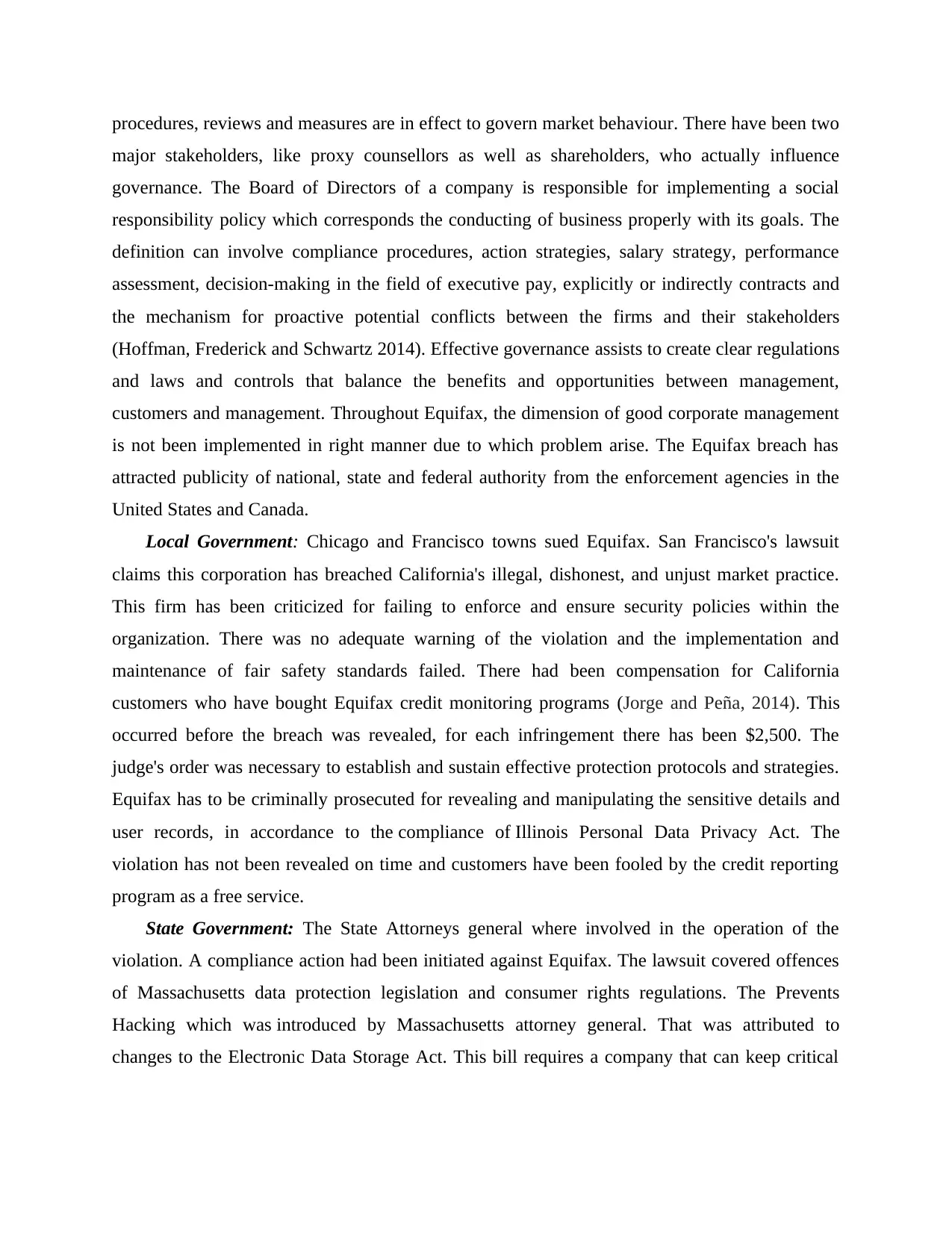
procedures, reviews and measures are in effect to govern market behaviour. There have been two
major stakeholders, like proxy counsellors as well as shareholders, who actually influence
governance. The Board of Directors of a company is responsible for implementing a social
responsibility policy which corresponds the conducting of business properly with its goals. The
definition can involve compliance procedures, action strategies, salary strategy, performance
assessment, decision-making in the field of executive pay, explicitly or indirectly contracts and
the mechanism for proactive potential conflicts between the firms and their stakeholders
(Hoffman, Frederick and Schwartz 2014). Effective governance assists to create clear regulations
and laws and controls that balance the benefits and opportunities between management,
customers and management. Throughout Equifax, the dimension of good corporate management
is not been implemented in right manner due to which problem arise. The Equifax breach has
attracted publicity of national, state and federal authority from the enforcement agencies in the
United States and Canada.
Local Government: Chicago and Francisco towns sued Equifax. San Francisco's lawsuit
claims this corporation has breached California's illegal, dishonest, and unjust market practice.
This firm has been criticized for failing to enforce and ensure security policies within the
organization. There was no adequate warning of the violation and the implementation and
maintenance of fair safety standards failed. There had been compensation for California
customers who have bought Equifax credit monitoring programs (Jorge and Peña, 2014). This
occurred before the breach was revealed, for each infringement there has been $2,500. The
judge's order was necessary to establish and sustain effective protection protocols and strategies.
Equifax has to be criminally prosecuted for revealing and manipulating the sensitive details and
user records, in accordance to the compliance of Illinois Personal Data Privacy Act. The
violation has not been revealed on time and customers have been fooled by the credit reporting
program as a free service.
State Government: The State Attorneys general where involved in the operation of the
violation. A compliance action had been initiated against Equifax. The lawsuit covered offences
of Massachusetts data protection legislation and consumer rights regulations. The Prevents
Hacking which was introduced by Massachusetts attorney general. That was attributed to
changes to the Electronic Data Storage Act. This bill requires a company that can keep critical
major stakeholders, like proxy counsellors as well as shareholders, who actually influence
governance. The Board of Directors of a company is responsible for implementing a social
responsibility policy which corresponds the conducting of business properly with its goals. The
definition can involve compliance procedures, action strategies, salary strategy, performance
assessment, decision-making in the field of executive pay, explicitly or indirectly contracts and
the mechanism for proactive potential conflicts between the firms and their stakeholders
(Hoffman, Frederick and Schwartz 2014). Effective governance assists to create clear regulations
and laws and controls that balance the benefits and opportunities between management,
customers and management. Throughout Equifax, the dimension of good corporate management
is not been implemented in right manner due to which problem arise. The Equifax breach has
attracted publicity of national, state and federal authority from the enforcement agencies in the
United States and Canada.
Local Government: Chicago and Francisco towns sued Equifax. San Francisco's lawsuit
claims this corporation has breached California's illegal, dishonest, and unjust market practice.
This firm has been criticized for failing to enforce and ensure security policies within the
organization. There was no adequate warning of the violation and the implementation and
maintenance of fair safety standards failed. There had been compensation for California
customers who have bought Equifax credit monitoring programs (Jorge and Peña, 2014). This
occurred before the breach was revealed, for each infringement there has been $2,500. The
judge's order was necessary to establish and sustain effective protection protocols and strategies.
Equifax has to be criminally prosecuted for revealing and manipulating the sensitive details and
user records, in accordance to the compliance of Illinois Personal Data Privacy Act. The
violation has not been revealed on time and customers have been fooled by the credit reporting
program as a free service.
State Government: The State Attorneys general where involved in the operation of the
violation. A compliance action had been initiated against Equifax. The lawsuit covered offences
of Massachusetts data protection legislation and consumer rights regulations. The Prevents
Hacking which was introduced by Massachusetts attorney general. That was attributed to
changes to the Electronic Data Storage Act. This bill requires a company that can keep critical
Paraphrase This Document
Need a fresh take? Get an instant paraphrase of this document with our AI Paraphraser

New York citizen’s data for implementing technological, logistical and physical protections.
This involves extending the category of data this causes disclosure requirements.
Federal Government: This policy is carrying out numerous enquiries. The Federal Trade
Commission director has announced that they are undertaking a thorough inquiry into the
Equifax hack. Another group doing work on the Equifax hack calls the Bureau of Financial
Security for Consumers. This inquiry is carried out for insider dealing related to asset selling
before the violation (Luetge, Armbrüster and Müller, 2016).
PART 2
Approaches to Corporate Social Responsibility
Ethics is described as the concept that interacts with concepts of morals and expectations
about doing morally right practices and activities (CSR Approaches, 2020). The law covers
obligations and privileges of people. Here are the different definitions of corporate ethics
Teleological ethical theory
There are ideas that are correlated with practice outcomes that imply simple criteria for acts
which are right or wrong based on the bad or good created (Maniora, 2017). The various types of
ethical principles in teleology are listed below:
Ethical Egoism – As per this principle, if it creates and achieves positive outcomes that will
increase ones self-interest and behaviour is regarded as decent. By this hypothesis it is assumed
that the pursuit of one's own benefit is spiritual. At the other side, it's always important often to
ignore personal desires and do productive work towards others. Ethical egoism is distinct from
pathological selfishness due to this theory. For Equifax, it is believed that company would have
better represented clients and consumers and tries their best to keep the information in well
secure and protected way.
Utilitarianism- This philosophy states why every company activity is successful because
other customers get the most gratification from the outcomes. This illustrates that business
executives should create an overseas holiday for workers to fulfil the priorities. This allows for
acting in a manner that will help enhance worker satisfaction. This can be seen in the sense of
Equifax that certain business activities as well as practices must have certain laws and
regulations which meet the demands and commitments of the worker (Sigurjonsson, Vaiman and
Arnardottir, 2014).
This involves extending the category of data this causes disclosure requirements.
Federal Government: This policy is carrying out numerous enquiries. The Federal Trade
Commission director has announced that they are undertaking a thorough inquiry into the
Equifax hack. Another group doing work on the Equifax hack calls the Bureau of Financial
Security for Consumers. This inquiry is carried out for insider dealing related to asset selling
before the violation (Luetge, Armbrüster and Müller, 2016).
PART 2
Approaches to Corporate Social Responsibility
Ethics is described as the concept that interacts with concepts of morals and expectations
about doing morally right practices and activities (CSR Approaches, 2020). The law covers
obligations and privileges of people. Here are the different definitions of corporate ethics
Teleological ethical theory
There are ideas that are correlated with practice outcomes that imply simple criteria for acts
which are right or wrong based on the bad or good created (Maniora, 2017). The various types of
ethical principles in teleology are listed below:
Ethical Egoism – As per this principle, if it creates and achieves positive outcomes that will
increase ones self-interest and behaviour is regarded as decent. By this hypothesis it is assumed
that the pursuit of one's own benefit is spiritual. At the other side, it's always important often to
ignore personal desires and do productive work towards others. Ethical egoism is distinct from
pathological selfishness due to this theory. For Equifax, it is believed that company would have
better represented clients and consumers and tries their best to keep the information in well
secure and protected way.
Utilitarianism- This philosophy states why every company activity is successful because
other customers get the most gratification from the outcomes. This illustrates that business
executives should create an overseas holiday for workers to fulfil the priorities. This allows for
acting in a manner that will help enhance worker satisfaction. This can be seen in the sense of
Equifax that certain business activities as well as practices must have certain laws and
regulations which meet the demands and commitments of the worker (Sigurjonsson, Vaiman and
Arnardottir, 2014).
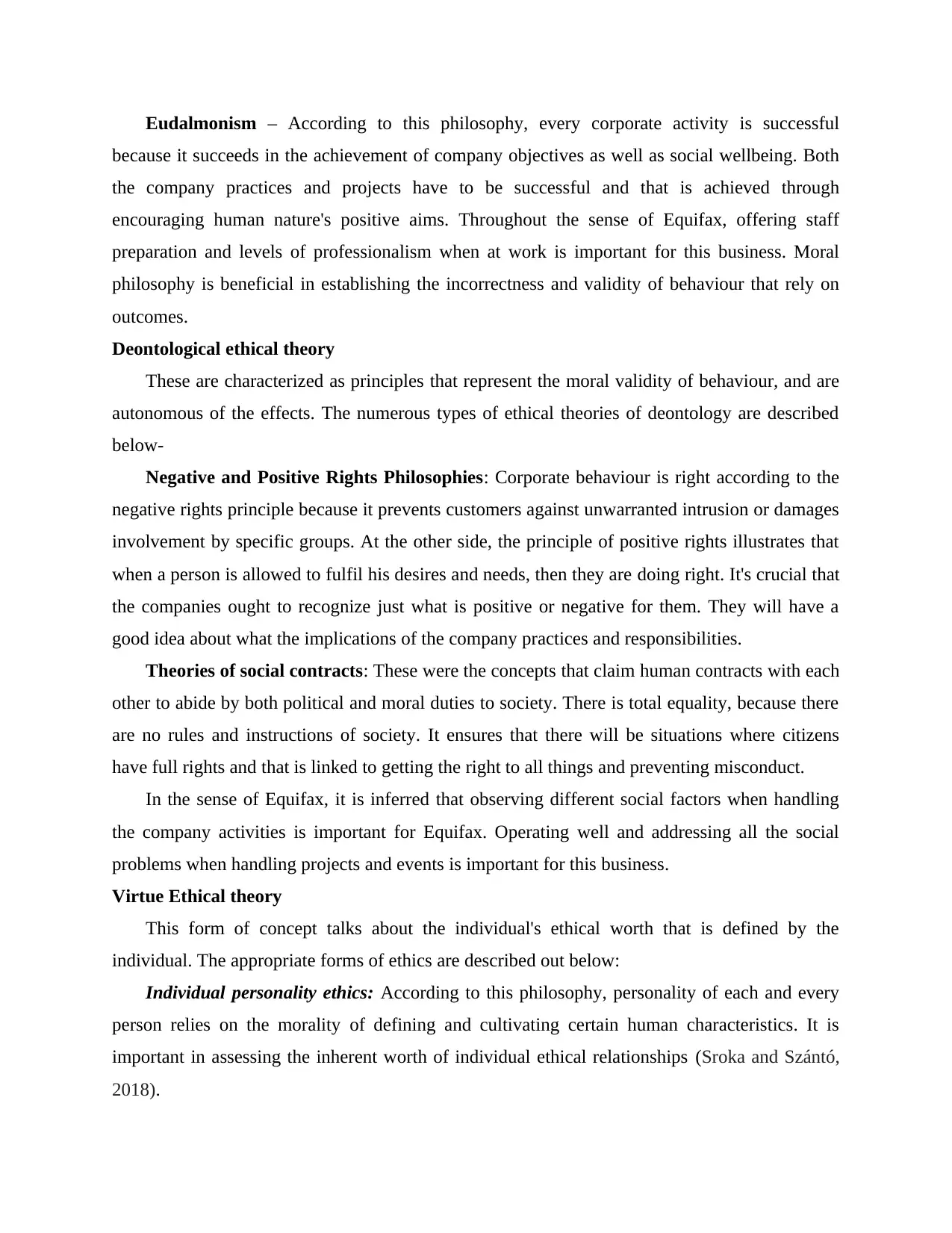
Eudalmonism – According to this philosophy, every corporate activity is successful
because it succeeds in the achievement of company objectives as well as social wellbeing. Both
the company practices and projects have to be successful and that is achieved through
encouraging human nature's positive aims. Throughout the sense of Equifax, offering staff
preparation and levels of professionalism when at work is important for this business. Moral
philosophy is beneficial in establishing the incorrectness and validity of behaviour that rely on
outcomes.
Deontological ethical theory
These are characterized as principles that represent the moral validity of behaviour, and are
autonomous of the effects. The numerous types of ethical theories of deontology are described
below-
Negative and Positive Rights Philosophies: Corporate behaviour is right according to the
negative rights principle because it prevents customers against unwarranted intrusion or damages
involvement by specific groups. At the other side, the principle of positive rights illustrates that
when a person is allowed to fulfil his desires and needs, then they are doing right. It's crucial that
the companies ought to recognize just what is positive or negative for them. They will have a
good idea about what the implications of the company practices and responsibilities.
Theories of social contracts: These were the concepts that claim human contracts with each
other to abide by both political and moral duties to society. There is total equality, because there
are no rules and instructions of society. It ensures that there will be situations where citizens
have full rights and that is linked to getting the right to all things and preventing misconduct.
In the sense of Equifax, it is inferred that observing different social factors when handling
the company activities is important for Equifax. Operating well and addressing all the social
problems when handling projects and events is important for this business.
Virtue Ethical theory
This form of concept talks about the individual's ethical worth that is defined by the
individual. The appropriate forms of ethics are described out below:
Individual personality ethics: According to this philosophy, personality of each and every
person relies on the morality of defining and cultivating certain human characteristics. It is
important in assessing the inherent worth of individual ethical relationships (Sroka and Szántó,
2018).
because it succeeds in the achievement of company objectives as well as social wellbeing. Both
the company practices and projects have to be successful and that is achieved through
encouraging human nature's positive aims. Throughout the sense of Equifax, offering staff
preparation and levels of professionalism when at work is important for this business. Moral
philosophy is beneficial in establishing the incorrectness and validity of behaviour that rely on
outcomes.
Deontological ethical theory
These are characterized as principles that represent the moral validity of behaviour, and are
autonomous of the effects. The numerous types of ethical theories of deontology are described
below-
Negative and Positive Rights Philosophies: Corporate behaviour is right according to the
negative rights principle because it prevents customers against unwarranted intrusion or damages
involvement by specific groups. At the other side, the principle of positive rights illustrates that
when a person is allowed to fulfil his desires and needs, then they are doing right. It's crucial that
the companies ought to recognize just what is positive or negative for them. They will have a
good idea about what the implications of the company practices and responsibilities.
Theories of social contracts: These were the concepts that claim human contracts with each
other to abide by both political and moral duties to society. There is total equality, because there
are no rules and instructions of society. It ensures that there will be situations where citizens
have full rights and that is linked to getting the right to all things and preventing misconduct.
In the sense of Equifax, it is inferred that observing different social factors when handling
the company activities is important for Equifax. Operating well and addressing all the social
problems when handling projects and events is important for this business.
Virtue Ethical theory
This form of concept talks about the individual's ethical worth that is defined by the
individual. The appropriate forms of ethics are described out below:
Individual personality ethics: According to this philosophy, personality of each and every
person relies on the morality of defining and cultivating certain human characteristics. It is
important in assessing the inherent worth of individual ethical relationships (Sroka and Szántó,
2018).
⊘ This is a preview!⊘
Do you want full access?
Subscribe today to unlock all pages.

Trusted by 1+ million students worldwide
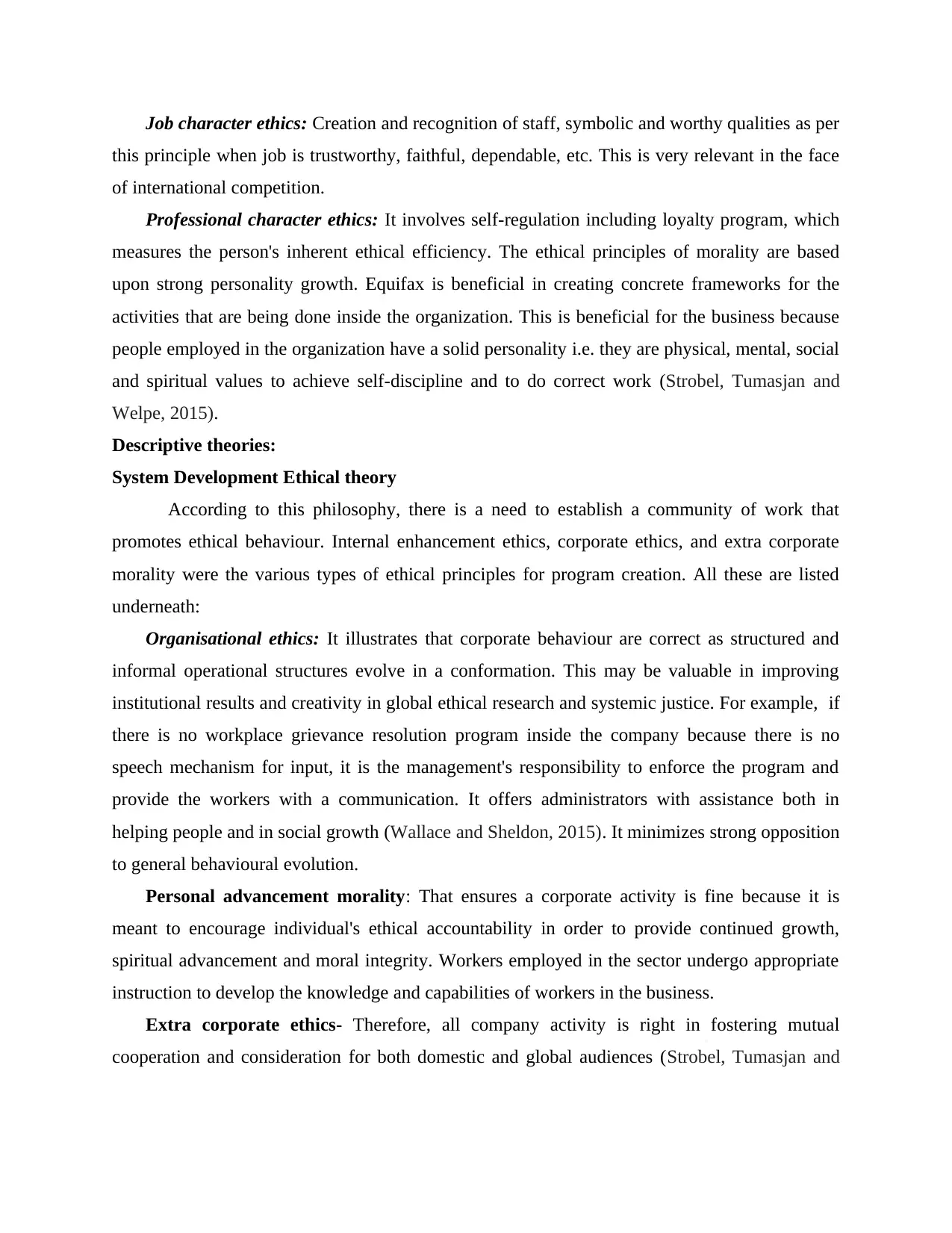
Job character ethics: Creation and recognition of staff, symbolic and worthy qualities as per
this principle when job is trustworthy, faithful, dependable, etc. This is very relevant in the face
of international competition.
Professional character ethics: It involves self-regulation including loyalty program, which
measures the person's inherent ethical efficiency. The ethical principles of morality are based
upon strong personality growth. Equifax is beneficial in creating concrete frameworks for the
activities that are being done inside the organization. This is beneficial for the business because
people employed in the organization have a solid personality i.e. they are physical, mental, social
and spiritual values to achieve self-discipline and to do correct work (Strobel, Tumasjan and
Welpe, 2015).
Descriptive theories:
System Development Ethical theory
According to this philosophy, there is a need to establish a community of work that
promotes ethical behaviour. Internal enhancement ethics, corporate ethics, and extra corporate
morality were the various types of ethical principles for program creation. All these are listed
underneath:
Organisational ethics: It illustrates that corporate behaviour are correct as structured and
informal operational structures evolve in a conformation. This may be valuable in improving
institutional results and creativity in global ethical research and systemic justice. For example, if
there is no workplace grievance resolution program inside the company because there is no
speech mechanism for input, it is the management's responsibility to enforce the program and
provide the workers with a communication. It offers administrators with assistance both in
helping people and in social growth (Wallace and Sheldon, 2015). It minimizes strong opposition
to general behavioural evolution.
Personal advancement morality: That ensures a corporate activity is fine because it is
meant to encourage individual's ethical accountability in order to provide continued growth,
spiritual advancement and moral integrity. Workers employed in the sector undergo appropriate
instruction to develop the knowledge and capabilities of workers in the business.
Extra corporate ethics- Therefore, all company activity is right in fostering mutual
cooperation and consideration for both domestic and global audiences (Strobel, Tumasjan and
this principle when job is trustworthy, faithful, dependable, etc. This is very relevant in the face
of international competition.
Professional character ethics: It involves self-regulation including loyalty program, which
measures the person's inherent ethical efficiency. The ethical principles of morality are based
upon strong personality growth. Equifax is beneficial in creating concrete frameworks for the
activities that are being done inside the organization. This is beneficial for the business because
people employed in the organization have a solid personality i.e. they are physical, mental, social
and spiritual values to achieve self-discipline and to do correct work (Strobel, Tumasjan and
Welpe, 2015).
Descriptive theories:
System Development Ethical theory
According to this philosophy, there is a need to establish a community of work that
promotes ethical behaviour. Internal enhancement ethics, corporate ethics, and extra corporate
morality were the various types of ethical principles for program creation. All these are listed
underneath:
Organisational ethics: It illustrates that corporate behaviour are correct as structured and
informal operational structures evolve in a conformation. This may be valuable in improving
institutional results and creativity in global ethical research and systemic justice. For example, if
there is no workplace grievance resolution program inside the company because there is no
speech mechanism for input, it is the management's responsibility to enforce the program and
provide the workers with a communication. It offers administrators with assistance both in
helping people and in social growth (Wallace and Sheldon, 2015). It minimizes strong opposition
to general behavioural evolution.
Personal advancement morality: That ensures a corporate activity is fine because it is
meant to encourage individual's ethical accountability in order to provide continued growth,
spiritual advancement and moral integrity. Workers employed in the sector undergo appropriate
instruction to develop the knowledge and capabilities of workers in the business.
Extra corporate ethics- Therefore, all company activity is right in fostering mutual
cooperation and consideration for both domestic and global audiences (Strobel, Tumasjan and
Paraphrase This Document
Need a fresh take? Get an instant paraphrase of this document with our AI Paraphraser
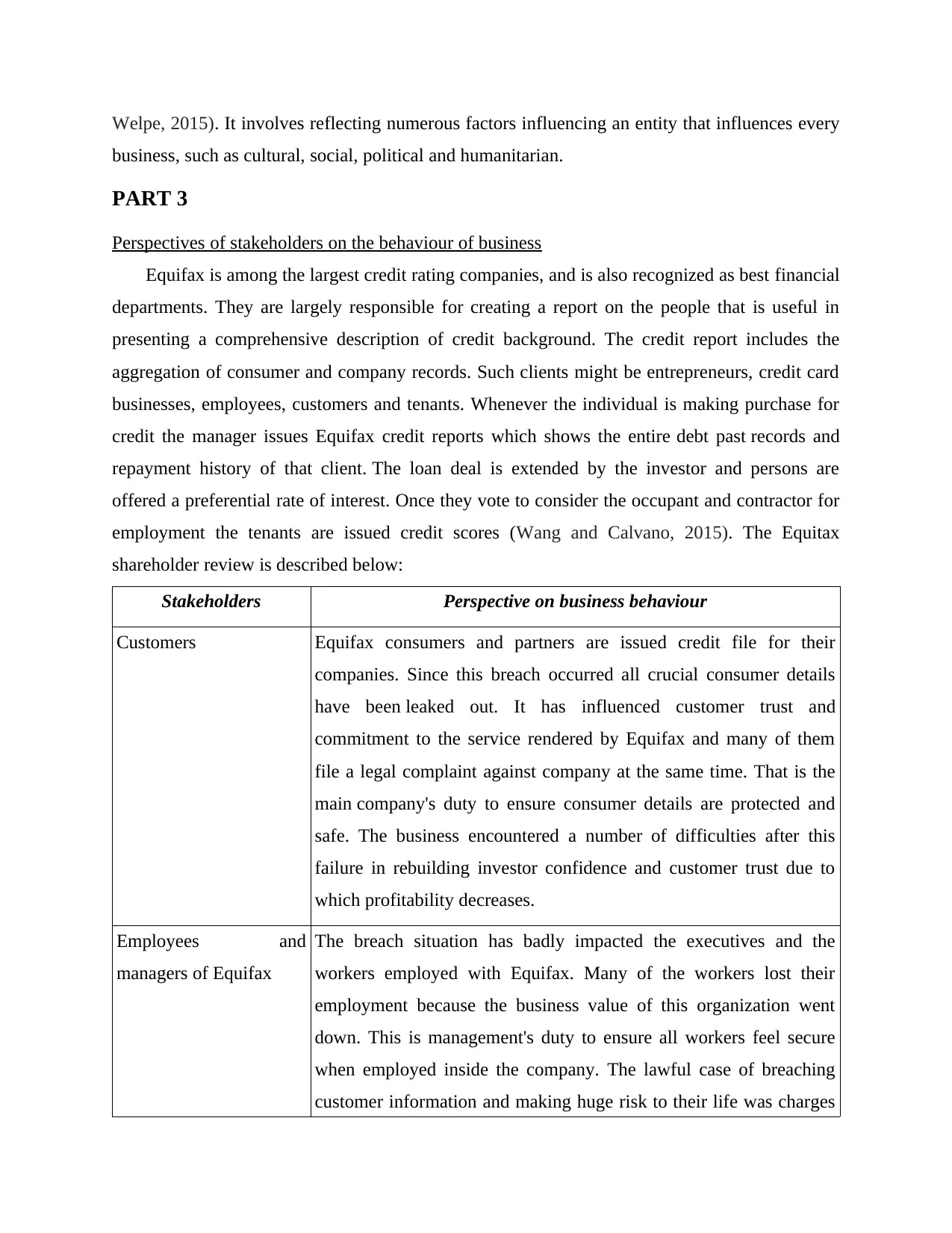
Welpe, 2015). It involves reflecting numerous factors influencing an entity that influences every
business, such as cultural, social, political and humanitarian.
PART 3
Perspectives of stakeholders on the behaviour of business
Equifax is among the largest credit rating companies, and is also recognized as best financial
departments. They are largely responsible for creating a report on the people that is useful in
presenting a comprehensive description of credit background. The credit report includes the
aggregation of consumer and company records. Such clients might be entrepreneurs, credit card
businesses, employees, customers and tenants. Whenever the individual is making purchase for
credit the manager issues Equifax credit reports which shows the entire debt past records and
repayment history of that client. The loan deal is extended by the investor and persons are
offered a preferential rate of interest. Once they vote to consider the occupant and contractor for
employment the tenants are issued credit scores (Wang and Calvano, 2015). The Equitax
shareholder review is described below:
Stakeholders Perspective on business behaviour
Customers Equifax consumers and partners are issued credit file for their
companies. Since this breach occurred all crucial consumer details
have been leaked out. It has influenced customer trust and
commitment to the service rendered by Equifax and many of them
file a legal complaint against company at the same time. That is the
main company's duty to ensure consumer details are protected and
safe. The business encountered a number of difficulties after this
failure in rebuilding investor confidence and customer trust due to
which profitability decreases.
Employees and
managers of Equifax
The breach situation has badly impacted the executives and the
workers employed with Equifax. Many of the workers lost their
employment because the business value of this organization went
down. This is management's duty to ensure all workers feel secure
when employed inside the company. The lawful case of breaching
customer information and making huge risk to their life was charges
business, such as cultural, social, political and humanitarian.
PART 3
Perspectives of stakeholders on the behaviour of business
Equifax is among the largest credit rating companies, and is also recognized as best financial
departments. They are largely responsible for creating a report on the people that is useful in
presenting a comprehensive description of credit background. The credit report includes the
aggregation of consumer and company records. Such clients might be entrepreneurs, credit card
businesses, employees, customers and tenants. Whenever the individual is making purchase for
credit the manager issues Equifax credit reports which shows the entire debt past records and
repayment history of that client. The loan deal is extended by the investor and persons are
offered a preferential rate of interest. Once they vote to consider the occupant and contractor for
employment the tenants are issued credit scores (Wang and Calvano, 2015). The Equitax
shareholder review is described below:
Stakeholders Perspective on business behaviour
Customers Equifax consumers and partners are issued credit file for their
companies. Since this breach occurred all crucial consumer details
have been leaked out. It has influenced customer trust and
commitment to the service rendered by Equifax and many of them
file a legal complaint against company at the same time. That is the
main company's duty to ensure consumer details are protected and
safe. The business encountered a number of difficulties after this
failure in rebuilding investor confidence and customer trust due to
which profitability decreases.
Employees and
managers of Equifax
The breach situation has badly impacted the executives and the
workers employed with Equifax. Many of the workers lost their
employment because the business value of this organization went
down. This is management's duty to ensure all workers feel secure
when employed inside the company. The lawful case of breaching
customer information and making huge risk to their life was charges
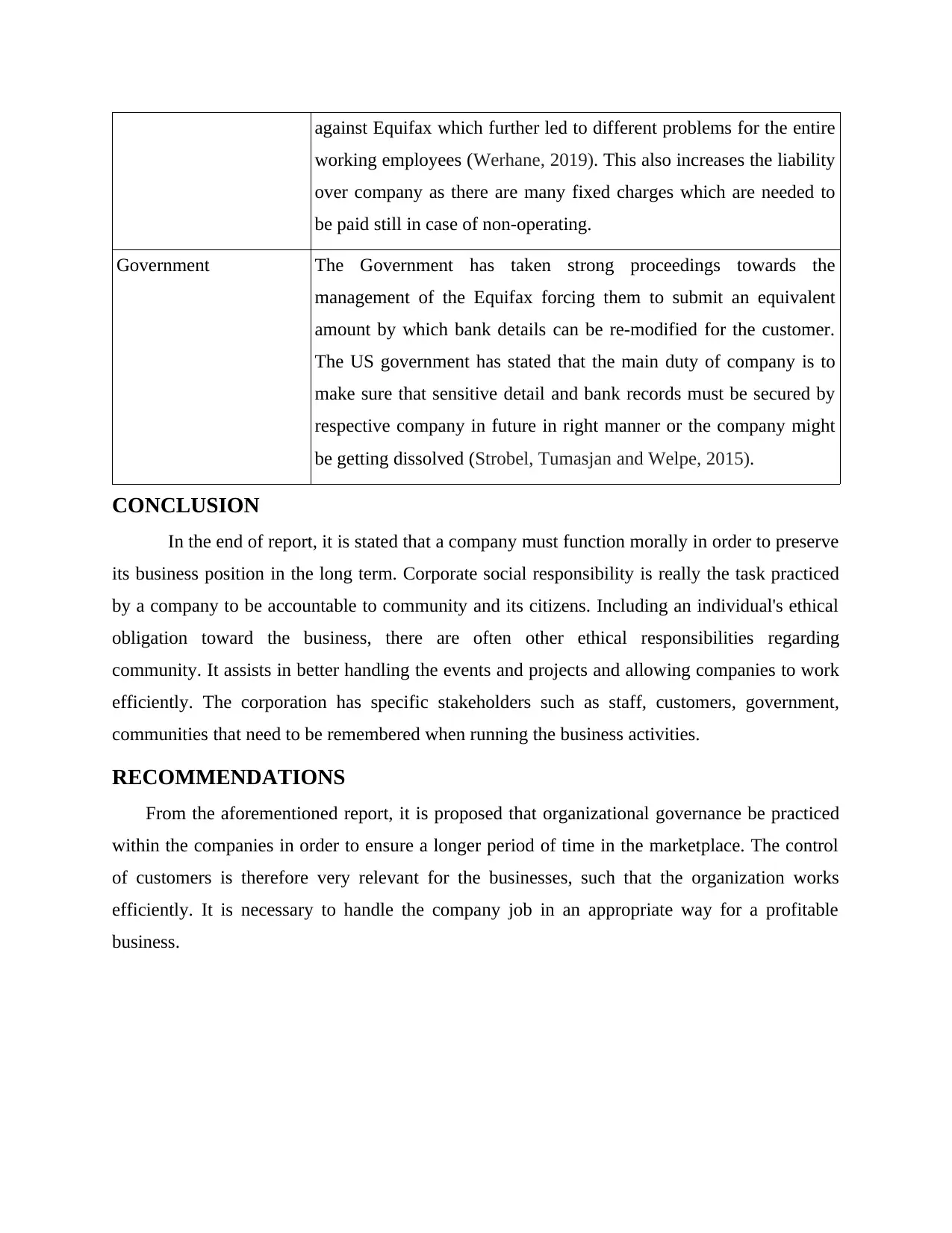
against Equifax which further led to different problems for the entire
working employees (Werhane, 2019). This also increases the liability
over company as there are many fixed charges which are needed to
be paid still in case of non-operating.
Government The Government has taken strong proceedings towards the
management of the Equifax forcing them to submit an equivalent
amount by which bank details can be re-modified for the customer.
The US government has stated that the main duty of company is to
make sure that sensitive detail and bank records must be secured by
respective company in future in right manner or the company might
be getting dissolved (Strobel, Tumasjan and Welpe, 2015).
CONCLUSION
In the end of report, it is stated that a company must function morally in order to preserve
its business position in the long term. Corporate social responsibility is really the task practiced
by a company to be accountable to community and its citizens. Including an individual's ethical
obligation toward the business, there are often other ethical responsibilities regarding
community. It assists in better handling the events and projects and allowing companies to work
efficiently. The corporation has specific stakeholders such as staff, customers, government,
communities that need to be remembered when running the business activities.
RECOMMENDATIONS
From the aforementioned report, it is proposed that organizational governance be practiced
within the companies in order to ensure a longer period of time in the marketplace. The control
of customers is therefore very relevant for the businesses, such that the organization works
efficiently. It is necessary to handle the company job in an appropriate way for a profitable
business.
working employees (Werhane, 2019). This also increases the liability
over company as there are many fixed charges which are needed to
be paid still in case of non-operating.
Government The Government has taken strong proceedings towards the
management of the Equifax forcing them to submit an equivalent
amount by which bank details can be re-modified for the customer.
The US government has stated that the main duty of company is to
make sure that sensitive detail and bank records must be secured by
respective company in future in right manner or the company might
be getting dissolved (Strobel, Tumasjan and Welpe, 2015).
CONCLUSION
In the end of report, it is stated that a company must function morally in order to preserve
its business position in the long term. Corporate social responsibility is really the task practiced
by a company to be accountable to community and its citizens. Including an individual's ethical
obligation toward the business, there are often other ethical responsibilities regarding
community. It assists in better handling the events and projects and allowing companies to work
efficiently. The corporation has specific stakeholders such as staff, customers, government,
communities that need to be remembered when running the business activities.
RECOMMENDATIONS
From the aforementioned report, it is proposed that organizational governance be practiced
within the companies in order to ensure a longer period of time in the marketplace. The control
of customers is therefore very relevant for the businesses, such that the organization works
efficiently. It is necessary to handle the company job in an appropriate way for a profitable
business.
⊘ This is a preview!⊘
Do you want full access?
Subscribe today to unlock all pages.

Trusted by 1+ million students worldwide
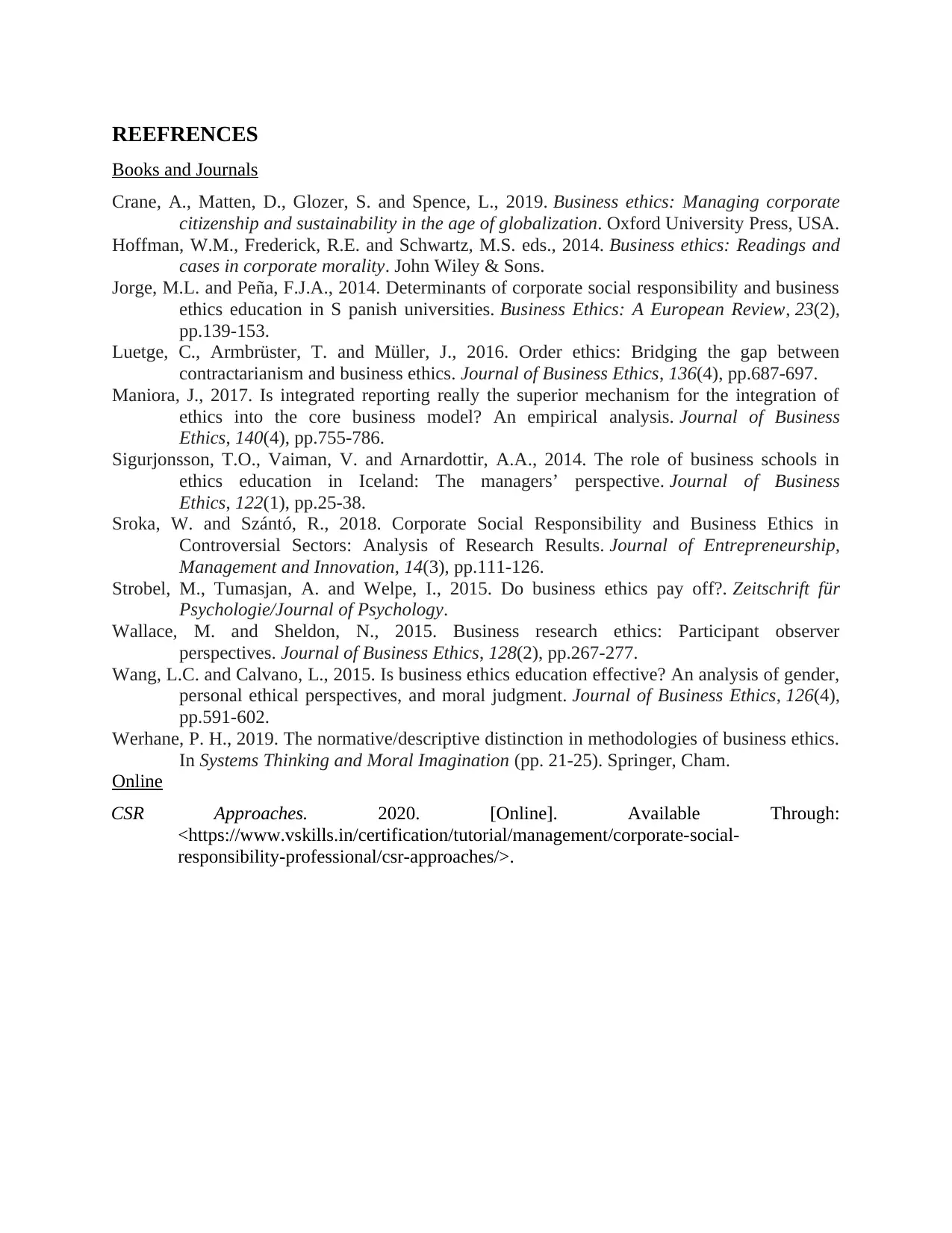
REEFRENCES
Books and Journals
Crane, A., Matten, D., Glozer, S. and Spence, L., 2019. Business ethics: Managing corporate
citizenship and sustainability in the age of globalization. Oxford University Press, USA.
Hoffman, W.M., Frederick, R.E. and Schwartz, M.S. eds., 2014. Business ethics: Readings and
cases in corporate morality. John Wiley & Sons.
Jorge, M.L. and Peña, F.J.A., 2014. Determinants of corporate social responsibility and business
ethics education in S panish universities. Business Ethics: A European Review, 23(2),
pp.139-153.
Luetge, C., Armbrüster, T. and Müller, J., 2016. Order ethics: Bridging the gap between
contractarianism and business ethics. Journal of Business Ethics, 136(4), pp.687-697.
Maniora, J., 2017. Is integrated reporting really the superior mechanism for the integration of
ethics into the core business model? An empirical analysis. Journal of Business
Ethics, 140(4), pp.755-786.
Sigurjonsson, T.O., Vaiman, V. and Arnardottir, A.A., 2014. The role of business schools in
ethics education in Iceland: The managers’ perspective. Journal of Business
Ethics, 122(1), pp.25-38.
Sroka, W. and Szántó, R., 2018. Corporate Social Responsibility and Business Ethics in
Controversial Sectors: Analysis of Research Results. Journal of Entrepreneurship,
Management and Innovation, 14(3), pp.111-126.
Strobel, M., Tumasjan, A. and Welpe, I., 2015. Do business ethics pay off?. Zeitschrift für
Psychologie/Journal of Psychology.
Wallace, M. and Sheldon, N., 2015. Business research ethics: Participant observer
perspectives. Journal of Business Ethics, 128(2), pp.267-277.
Wang, L.C. and Calvano, L., 2015. Is business ethics education effective? An analysis of gender,
personal ethical perspectives, and moral judgment. Journal of Business Ethics, 126(4),
pp.591-602.
Werhane, P. H., 2019. The normative/descriptive distinction in methodologies of business ethics.
In Systems Thinking and Moral Imagination (pp. 21-25). Springer, Cham.
Online
CSR Approaches. 2020. [Online]. Available Through:
<https://www.vskills.in/certification/tutorial/management/corporate-social-
responsibility-professional/csr-approaches/>.
Books and Journals
Crane, A., Matten, D., Glozer, S. and Spence, L., 2019. Business ethics: Managing corporate
citizenship and sustainability in the age of globalization. Oxford University Press, USA.
Hoffman, W.M., Frederick, R.E. and Schwartz, M.S. eds., 2014. Business ethics: Readings and
cases in corporate morality. John Wiley & Sons.
Jorge, M.L. and Peña, F.J.A., 2014. Determinants of corporate social responsibility and business
ethics education in S panish universities. Business Ethics: A European Review, 23(2),
pp.139-153.
Luetge, C., Armbrüster, T. and Müller, J., 2016. Order ethics: Bridging the gap between
contractarianism and business ethics. Journal of Business Ethics, 136(4), pp.687-697.
Maniora, J., 2017. Is integrated reporting really the superior mechanism for the integration of
ethics into the core business model? An empirical analysis. Journal of Business
Ethics, 140(4), pp.755-786.
Sigurjonsson, T.O., Vaiman, V. and Arnardottir, A.A., 2014. The role of business schools in
ethics education in Iceland: The managers’ perspective. Journal of Business
Ethics, 122(1), pp.25-38.
Sroka, W. and Szántó, R., 2018. Corporate Social Responsibility and Business Ethics in
Controversial Sectors: Analysis of Research Results. Journal of Entrepreneurship,
Management and Innovation, 14(3), pp.111-126.
Strobel, M., Tumasjan, A. and Welpe, I., 2015. Do business ethics pay off?. Zeitschrift für
Psychologie/Journal of Psychology.
Wallace, M. and Sheldon, N., 2015. Business research ethics: Participant observer
perspectives. Journal of Business Ethics, 128(2), pp.267-277.
Wang, L.C. and Calvano, L., 2015. Is business ethics education effective? An analysis of gender,
personal ethical perspectives, and moral judgment. Journal of Business Ethics, 126(4),
pp.591-602.
Werhane, P. H., 2019. The normative/descriptive distinction in methodologies of business ethics.
In Systems Thinking and Moral Imagination (pp. 21-25). Springer, Cham.
Online
CSR Approaches. 2020. [Online]. Available Through:
<https://www.vskills.in/certification/tutorial/management/corporate-social-
responsibility-professional/csr-approaches/>.
1 out of 10
Related Documents
Your All-in-One AI-Powered Toolkit for Academic Success.
+13062052269
info@desklib.com
Available 24*7 on WhatsApp / Email
![[object Object]](/_next/static/media/star-bottom.7253800d.svg)
Unlock your academic potential
Copyright © 2020–2026 A2Z Services. All Rights Reserved. Developed and managed by ZUCOL.





